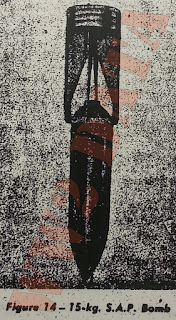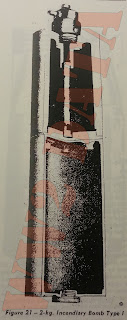Italian Explosive Ordnance
Overall length: 31 inches
Body length: 20.7 inches
Body diameter: 4.7 inches
Tail length: 13.8 inches
Tail width: 6.3 inches
Type of filling: TNT
Body length: 20.7 inches
Body diameter: 4.7 inches
Tail length: 13.8 inches
Tail width: 6.3 inches
Type of filling: TNT
Weight of filling: 5.2 kilograms
Total weight: 15.5 kilograms
Fuzing: Tail - Type N
Total weight: 15.5 kilograms
Fuzing: Tail - Type N
Color and markings: Overall grey; red nose
Description: The bomb is thick-walled with a steel body and nose cast in one piece, to which a dome-shaped base is attached.
Description: The bomb is thick-walled with a steel body and nose cast in one piece, to which a dome-shaped base is attached.
31kg S.A.P. Bomb
Overall length: 31.7 inches
Body length: 22.5 inches
Body diameter: 6.4 inches
Tail length: 12.5 inches
Tail width: 7.2 inches
Type of filling: TNT
Body length: 22.5 inches
Body diameter: 6.4 inches
Tail length: 12.5 inches
Tail width: 7.2 inches
Type of filling: TNT
Weight of filling: 10.5 kilograms
Total weight: 31 kilograms (approx.)
Fuzing: Tail only - Type N-2
Total weight: 31 kilograms (approx.)
Fuzing: Tail only - Type N-2
Color and markings: Overall grey; red nose.
Description: The thick-walled steel body has a heavy nose, larger than the rest of the body, welded on. A suspension band is bolted about the body. The sheet-metal tail is attached to a band which clamps around the body.
Overall length: 50.5 inches
Body length: 31 inches
Body diameter: 9.9 inches
Wall thickness: 0.5 inch
Tail length: 21.3 inches
Tail width: 9.9 inches
Type of filling: Amatol
Weight of filling: 27.3 kilograms
Body length: 31 inches
Body diameter: 9.9 inches
Wall thickness: 0.5 inch
Tail length: 21.3 inches
Tail width: 9.9 inches
Type of filling: Amatol
Weight of filling: 27.3 kilograms
Total weight: 109 kilograms
Fuzing: Tail only - Type C-1 or Y-1
Fuzing: Tail only - Type C-1 or Y-1
Color and markings: Overall grey or dull blue; red band on nose
Description: The bomb has a single-piece casing with a base plate attached by two rows of screws. A sheet metal tail is attached to a base plate by screws.
104kg S.A.P. Bomb
Overall length: 43 inches
Body length: 28 inches
Body diameter: 10 inches
Tail length: 15 inches (approx.)
Tail width: 11 inches
Type of filling: TNT
Body length: 28 inches
Body diameter: 10 inches
Tail length: 15 inches (approx.)
Tail width: 11 inches
Type of filling: TNT
Weight of filling: 30 kilograms (approx.)
Total weight: 104 kilograms
Total weight: 104 kilograms
Fuzing: Tail only - Type C
Color and markings: Overall grey; red nose
Description: The steel body and nose are cast in one piece. A dome-shaped base plate receives the sheet-metal tail fins, which are attached to a metal band which clamps around the body.
Description: The steel body and nose are cast in one piece. A dome-shaped base plate receives the sheet-metal tail fins, which are attached to a metal band which clamps around the body.
12kg Smoke Bomb
Overall length: 47 inches
Body length: 33 inches
Body diameter: 5.2 inches
Wall thickness: Unknown
Tail length: 14 inches
Tail width: 7 inches
Type of filling: Smoke composition
Body length: 33 inches
Body diameter: 5.2 inches
Wall thickness: Unknown
Tail length: 14 inches
Tail width: 7 inches
Type of filling: Smoke composition
Total weight: 28 pounds
Fuzing: Nose only - Special fuze for this bomb
Color and markings: Overall grey; red tail
Description: Body is light alloy all-welded construction (including tail unit) with longitudinal seam down the body. Mounted to fuze body on a central stand is the smoke-producing composition.
There are 26 smoke pellets, each 3 inches in diameter and 1 inch thick, made of purple composition, enclosed in a perforated metal container. Between each one and the next there is a metal spacer. A length of safety fuze leads from the fuze to the pellets and then to a self-destroying charge in the nose.
Description: Body is light alloy all-welded construction (including tail unit) with longitudinal seam down the body. Mounted to fuze body on a central stand is the smoke-producing composition.
There are 26 smoke pellets, each 3 inches in diameter and 1 inch thick, made of purple composition, enclosed in a perforated metal container. Between each one and the next there is a metal spacer. A length of safety fuze leads from the fuze to the pellets and then to a self-destroying charge in the nose.
Overall length: 6.1 inches
Body length: 4.5 inches
Body diameter: 2.75 inches
Body length: 4.5 inches
Body diameter: 2.75 inches
Total weight: 0.5 kilograms (approx.)
IT
FI
Fuzing: All - Type K
IT
Overall length: 5.1 inches
Body length: 3.5 inches
Body diameter: 2.5 inches
Body length: 3.5 inches
Body diameter: 2.5 inches
Total weight: 0.5 kilograms (approx.)
FI
Overall length: 4.95 inches
Body length: 3.35 inches
Body diameter: 2.5 inches
Body length: 3.35 inches
Body diameter: 2.5 inches
Total weight: 0.5 kilograms (approx.)
Fuzing: All - Type K
Color and markings:
Type IP: Overall light green; IP stenciled in black on the body
Type IT: Overall dark green; IT stenciled in black on the body
Type FI: Overall field grey; FI stenciled in black on the body
Description:
Type IP: This bomb consists of a thin mild-steel container of cylindrical shape whose filling consists of cotton wicks soaked in gasoline.
Type IT: Bomb is also of thin sheet mild-steel of cylindrical shape; but the main filling is thermite.
Type FI: The casing is of mild-steel and somewhat thicker than in the above two cases. The main filling is phosphorus.
Remarks: These bombs are usually dropped in a bomb container.
1kg Incendiary Bombs Types I and II
Overall length: 6.1 inches
Body length: 4.6 inches
Body diameter: 2.7 inches
Type of filling: Magnesium and thermite mix
Total weight: 1kg (approx.)
Body length: 4.6 inches
Body diameter: 2.7 inches
Type of filling: Magnesium and thermite mix
Total weight: 1kg (approx.)
Weight of filling:
-Magnesium: 0.084 kg
-Thermite: 0.473 kg
Fuzing: Type K
Color and markings: Overall reddish-brown; red nose-Magnesium: 0.084 kg
-Thermite: 0.473 kg
Fuzing: Type K
Description:
-Type I: The bomb is a tail-less cylinder made of electron metal. On the curve surface are three small holes plugged with cork. These act as vent holes when the thermite filling is ignited. The thermite is in the form of a lightly pressed filling, pressed in two halves, with a central cylindrical which is filled with magnesium powder.
Below the fuze is a powder pellet which is separated from the thermite by a paper disc which is glued to a cardboard ring. Through the paper disc is looped a piece of quick-match which extends into the magnesium.
-Type II: This type made of the same material and having the same dimensions as the Type I, differs in the internal arrangement for igniting the thermite. In place of the quick-match, a thin aluminum tube is inserted in the magnesium filling. This tube contains a number of holes on its surface covered by thin paper, and is filled with magnesium powder. It is sealed at its lower end by a cork plug.
Remarks:
1. These bombs can be dropped singly or in a bomb container.
2. These bombs were used also for sabotage work by using the fuze Type H.
2kg Incendiary Bombs Types I and II
Overall length: 12.2 inches
Body length: 10.6 inches
Body diameter: 2.7 inches
Wall thickness:
-Upper cylinder: 0.34 inch
-Lower cylinder: 0.06 inch
Type of filling:
-Type I: Thermite and oil
-Type II: Magnesium, Mercuric oxide, and Nitrobenzone
Body length: 10.6 inches
Body diameter: 2.7 inches
Wall thickness:
-Upper cylinder: 0.34 inch
-Lower cylinder: 0.06 inch
Type of filling:
-Type I: Thermite and oil
-Type II: Magnesium, Mercuric oxide, and Nitrobenzone
Weight of filling:
-Type I: 0.339 kg oil, 0.66 kg mix
-Type II: Unknown
Total weight:
-Type I: 2.12 kg
-Type II: Unknown
Fuzing: Type K
Color and markings:-Type I: 0.339 kg oil, 0.66 kg mix
-Type II: Unknown
Total weight:
-Type I: 2.12 kg
-Type II: Unknown
Fuzing: Type K
-Type I: Overall grey; red nose
-Type II: Overall reddish-brown; red nose
Description:
-Type I: The bomb consists of two cylinders screwed together. The upper cylinder is the same as the 1kg Incendiary Bomb Type II, except that the base plate is drilled to take four screws which secure the top plate of the lower cylinder to the base plate of the upper cylinder. The lower portion is of sheet steel and contains a high-boiling turpentine oil.
-Type II: This bomb is very similar to the Type I, except for the filling in both the upper and lower cylinders. The upper part contains magnesium and mercuric oxide powders, and the other contains nitrobenzene.
20kg Incendiary Bomb
Overall length: 34 inches
Body length: 20.5 inches
Body diameter: 6.3 inches
Wall thickness: 0.75 inch
Tail length: 15.8 inches
Tail width: 6.3 inches
Type of filling: Thermite
Body length: 20.5 inches
Body diameter: 6.3 inches
Wall thickness: 0.75 inch
Tail length: 15.8 inches
Tail width: 6.3 inches
Type of filling: Thermite
Weight of filling: 10.58 kilograms
Total weight: 20.17 kilograms
Total weight: 20.17 kilograms
Fuzing: Tail only - Type E
Color and markings: Overall reddish-brown; red nose
Description: The bomb consists of nose body and tail, all secured by screws. The body is electron; the nose as a steel plug; and the tail is alloy or sheet metal. Fuze vanes halfway along the tail length insure limited terminal velocity for the vanes. Five holes at the rear of the bomb casing are closed by cork plugs. The fuze functions on impact; igniter fires thermite; corks blow out and filling burns about three minutes; then casing breaks and burns with a white heat for ten minutes.
Description: The bomb consists of nose body and tail, all secured by screws. The body is electron; the nose as a steel plug; and the tail is alloy or sheet metal. Fuze vanes halfway along the tail length insure limited terminal velocity for the vanes. Five holes at the rear of the bomb casing are closed by cork plugs. The fuze functions on impact; igniter fires thermite; corks blow out and filling burns about three minutes; then casing breaks and burns with a white heat for ten minutes.
70kg Incendiary Bomb
Overall length: 47.2 inches
Body length: 23.6 inches
Body diameter: 9.9 inches
Wall thickness: 1 inch
Tail length: 24 inches
Tail width: 9.9 inches
Type of filling: Thermite
Body length: 23.6 inches
Body diameter: 9.9 inches
Wall thickness: 1 inch
Tail length: 24 inches
Tail width: 9.9 inches
Type of filling: Thermite
Weight of filling: 36.6 kilograms
Total weight: 74.5 kilograms
Total weight: 74.5 kilograms
Fuzing: Tail only - Type G
Color and markings: Overall reddish-brown; red nose
Description: Bomb casing is electron metal. The nose is encased in a steel cap 12 inches long and 1/8 inch thick attached to the body by eight screws. The cap insures adequate penetration without damage to the casing. An alloy tail unit is secured to the body by eight screws. Vent holes, 1 and 1/4 inch in diameter, are plugged with cork. The igniter for the thermite filling is magnesium powder in an aluminum tube passing through the center of the tail into the bomb body.
Description: Bomb casing is electron metal. The nose is encased in a steel cap 12 inches long and 1/8 inch thick attached to the body by eight screws. The cap insures adequate penetration without damage to the casing. An alloy tail unit is secured to the body by eight screws. Vent holes, 1 and 1/4 inch in diameter, are plugged with cork. The igniter for the thermite filling is magnesium powder in an aluminum tube passing through the center of the tail into the bomb body.
Next Time: Italian Gas Bombs and Others









No comments:
Post a Comment